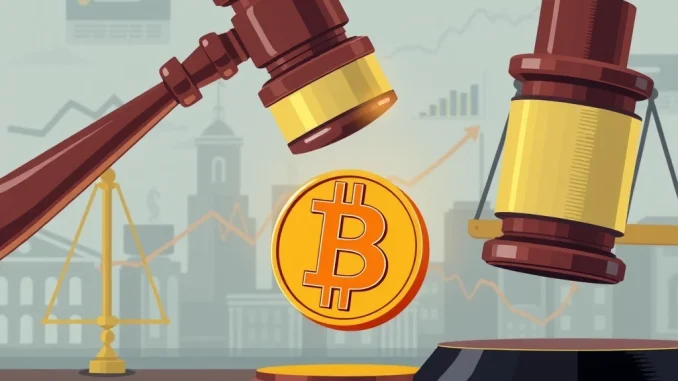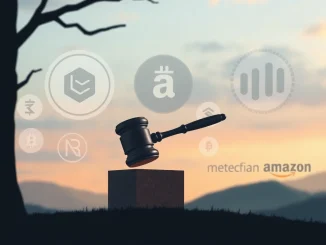
In a significant move underscoring the ongoing regulatory scrutiny of the digital asset space, the U.S. Securities and Exchange Commission (SEC) has filed charges against crypto investment firm Unicoin and several of its top executives. This development sends a strong signal about the SEC’s focus on protecting investors from deceptive practices within the cryptocurrency market. The core allegations revolve around claims that Unicoin misled investors and engaged in the sale of unregistered securities, raising over $100 million. Understanding the specifics of the SEC charges Unicoin faces is crucial for anyone navigating the crypto landscape.
What Are the Specific SEC Charges Unicoin Faces?
According to the SEC’s official complaint, Unicoin and its leadership stand accused of serious misconduct. The charges highlight alleged misrepresentations made to potential investors regarding the value and backing of the Unicoin token. Here’s a breakdown of the key allegations:
- False Asset Backing Claims: The SEC alleges that Unicoin falsely claimed its tokens were backed by substantial real-world assets, including valuable real estate. In reality, the complaint states the company’s actual assets were worth significantly less than what was advertised, creating a misleading picture for investors.
- Sale of Unregistered Securities: The SEC contends that Unicoin sold its tokens, referred to as “rights certificates,” which qualify as securities under U.S. law. The complaint alleges these securities were offered and sold to the public without being registered with the SEC, bypassing critical investor protection requirements.
- Raising Over $100 Million Through Deception: Through these alleged fraudulent and unregistered offerings, Unicoin is accused of raising more than $100 million from investors.
These charges paint a picture of a scheme designed to attract investment based on inflated claims and a disregard for securities laws.
Examining the Allegations of Crypto Fraud
The charges against Unicoin fall squarely under the umbrella of alleged crypto fraud. Fraud in the crypto space often involves misleading investors about the nature, value, or potential returns of digital assets. The Unicoin case, as described by the SEC, is a classic example of alleged misrepresentation regarding the underlying value of a token.
Claiming a token is backed by valuable assets when those assets are worth only a fraction of the promised value is a significant alleged deception. This type of claim is particularly appealing to investors seeking tangible value in the often volatile digital asset market. However, if the backing is not real, the promise is empty, potentially leading to substantial losses for investors.
The SEC’s focus on this aspect highlights its commitment to pursuing cases where the fundamental value proposition presented to investors is allegedly false. This case serves as a stark reminder that not all claims of asset backing in the crypto world are legitimate.
The Role of Crypto Regulation in Protecting Investors
This action by the SEC is a clear demonstration of the increasing role of crypto regulation. Regulatory bodies like the SEC are tasked with overseeing financial markets to ensure fairness, transparency, and investor protection. When companies, regardless of whether they operate with traditional or digital assets, are suspected of misleading the public and violating securities laws, regulators step in.
The debate around classifying crypto assets as securities is ongoing, but the SEC has consistently taken the position that many tokens and investment contracts in the crypto space fall under their purview. The Unicoin case underscores this position, as the SEC alleges the “rights certificates” sold by the company were unregistered securities.
Regulation aims to establish clear rules of the road, requiring companies to provide potential investors with truthful and comprehensive information about their offerings. When companies fail to register securities, investors miss out on crucial disclosures that could inform their investment decisions. This case reinforces the regulatory push for compliance within the digital asset industry.
What Does This Mean for Investor Protection Crypto?
The Unicoin case is a critical reminder about the importance of investor protection crypto. As the digital asset market matures, so do the tactics used by alleged fraudsters. Investors must remain vigilant and conduct thorough due diligence before committing funds.
Here are some actionable insights for investors based on cases like Unicoin:
- Question Asset Backing Claims: Be skeptical of claims that a token is heavily backed by valuable real-world assets unless there is clear, verifiable, and independently audited evidence.
- Verify Registration: If an offering sounds like an investment contract, check if the company is registered with the relevant financial regulators (like the SEC in the U.S.) or if the offering is registered. Unregistered offerings lack critical legal safeguards.
- Research the Team: Look into the background and track record of the executives and founders. Are they transparent? Do they have relevant experience?
- Beware of Unrealistic Promises: High-pressure sales tactics and guarantees of overly high or guaranteed returns are major red flags.
- Understand What You’re Buying: Don’t invest in something you don’t fully understand. Read whitepapers, terms, and conditions carefully.
Cases like Unicoin highlight the risks present and the need for investors to be their first line of defense.
The Broader Landscape of SEC Crypto Enforcement
The charges against Unicoin are part of a broader pattern of SEC crypto enforcement actions. The commission has been increasingly active in pursuing companies and individuals alleged to have violated securities laws in the digital asset space. These actions have targeted various activities, including:
- Unregistered securities offerings (like the Unicoin allegation).
- Fraudulent schemes (Ponzi schemes, pump-and-dumps).
- Operating unregistered exchanges or broker-dealers.
- Market manipulation.
The SEC’s stance is that existing securities laws apply to many crypto assets and activities. While the industry advocates for clearer rules, the SEC continues to use its enforcement powers based on its current interpretation of the law. This ongoing regulatory pressure is shaping how crypto businesses operate and interact with U.S. investors.
What Does the SEC Seek?
In its complaint, the SEC is seeking several remedies against Unicoin and the named executives. These include:
- The recovery of the alleged ill-gotten gains (disgorgement) obtained through the fraudulent scheme.
- The imposition of civil penalties against the company and individuals.
- Orders barring the executives from serving as officers or directors of any public company in the future.
These remedies aim to punish the alleged misconduct, deter future violations, and potentially return funds to harmed investors.
Conclusion: A Crucial Case for the Crypto Market
The SEC’s charges against Unicoin and its executives represent a significant development in the ongoing regulatory oversight of the cryptocurrency market. The allegations of false asset backing and the sale of unregistered securities underscore the types of risks investors face. This case serves as a potent reminder of the importance of robust crypto regulation and the need for unwavering investor protection crypto. As the legal process unfolds regarding the SEC charges Unicoin faces, the outcome will be closely watched by the industry and regulators alike, potentially setting precedents for future enforcement actions in the complex and evolving world of digital assets.



